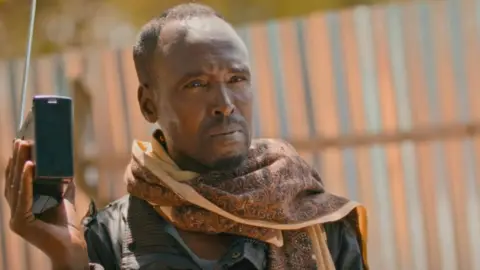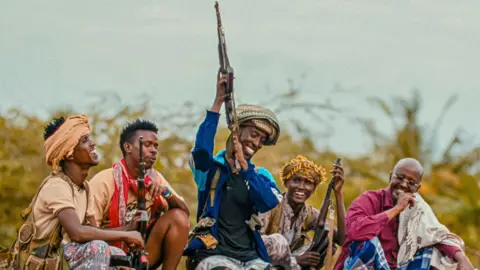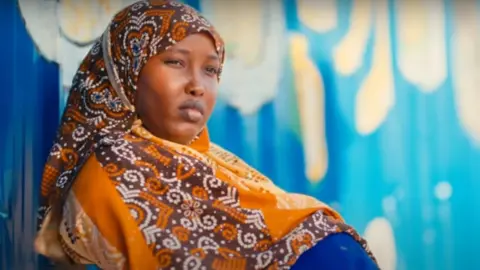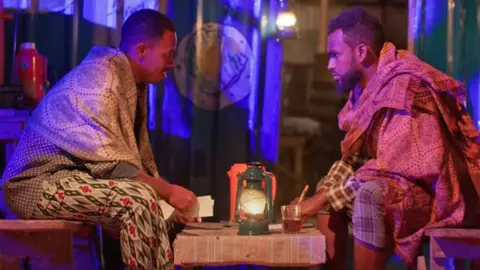Actor in film warning of revenge killings shot dead in family feud
Abdinasir Ali
BBC Somali service

 Astaan TV
Astaan TV
“No man avenged has ever risen from the grave” is the haunting tagline of a film that has shocked Somalis to the core in a case of life imitating art.
Called Aano Qabiil, meaning “Clan Vengeance”, the short film sought to highlight the futility of vendettas between rival clans that sometimes go back generations and lead to senseless killings – often of young men who are targeted just because of their lineage.
It was a poetic warning, a cry – a story intended not just to entertain, but to educate a wounded nation.
Since its release earlier this month, it has gone viral as people have learnt that one of the actors in the drama was later shot dead in exactly the kind of clan revenge killing the film had warned about.
Guudey Mohamed Geedi, a veteran of Somali cinema, had played a character who tried to intervene to stop the owner of a teashop from being killed as he hid in a building from gunmen from a rival clan.
Outside a woman is heard shouting: “Don’t let him leave alive, I want to drink his blood,” as Geedi’s character pleads: “He’s just a tea vendor – what did he do to you that warrants his death?”
Not long after the filming of Aano Qabiil wrapped up in the town of Bal’ad, around 30km (18 miles) north-east of the capital, Mogadishu, Geedi travelled to visit his family in the countryside.

 Astaan TV
Astaan TV
It is in rural areas that rivalries between Somali clans proliferate. Sometimes the disputes are about long-standing competition for resources such as grazing land or access to wells for camels and other livestock.
But even minor issues can sometimes spark a deadly feud – for example a remark by a politician in the capital.
When Geedi reached his small village outside Warsheikh, in the Middle Shabelle region, he did not know that tensions between two Abgal sub-clans were about to boil over.
The 45-year-old was shot dead outside his home in November by armed men as part of this long-standing inter-family feud.
No-one has been arrested for his murder and the authorities have not commented on the case.
It often happens that clan-related killings go un-investigated – especially in rural zones. They are seen as “private matters” or too complex to intervene in.
“He died in real life the same way as the violence played out in the film,” his friend Adaawe, who requested that only his first name be used, told the BBC.
“Only this time, there was no camera, no director to yell ‘cut’. No-one to plead for his life.”
Abdisiyaad Abdullhai Mohamed, who wrote and directed Aano Qabiil for Astaan TV, said Geedi had been instrumental during filming.
“We worked closely together. Guudey believed in the message we were trying to convey. He wasn’t just an actor; he was a key part of the vision I had for the story,” the 32-year-old told the BBC.
The film-maker grew up in a community often affected by stories of bloodshed, where people are killed in the name of seeking justice.
“I wanted to show the humanitarian cost that follows simply hearing the news that someone has been killed due to clan revenge,” he said.
“As Somalis, every time we hear someone has been killed, we never stop to think or ask ourselves if that person belonged to a close family that is now destroyed and a future lost.”
The story of the film centres on two friends, Ali and Salah, who belong to rival sub-groups of an unnamed clan.
Together they run a teashop in Bal’ad, when clan violence from the countryside intrudes upon their lives. Neither of them knows what has brought the feud to their doorstep.
“The same cursed clans we were born into are at war again,” says Ali, who at first manages to save Salah’s life before he himself becomes a target.
To avenge Ali’s death, Salah is then killed. The film ends with clansmen laughing over his bullet-ridden body near Ali’s grave – happy that honour has been satisfied.
“In my film, I showed how the death of Ali affects his wife, Sahra, who is pregnant. Overall, this film was a cry for help, meant to raise awareness among the Somali community,” said the director, Mohamed.

 Astaan TV
Astaan TV
Clan identity is deeply engrained in Somali society. The country has four major clans, and each has hundreds of sub-clans, with even those divided, depending on the region.
Many Somalis have grown up hearing about the killings of close relatives in the name of past grievances or clan rivalries.
Clan-related killings contribute to internal conflicts and displacement in Somalia, especially in rural areas.
But a 2023 report from PeaceRep, a research organisation based in the UK, highlighted the spread of clan revenge killings to cities in central Somalia.
Somali Peace Line, a local organisation, recorded in its 2022 annual report more than 160 clan-related killings in just one year, most of which went without justice, further fuelling the cycle of violence.
In some central regions, up to 80% of clan killings remain unresolved, leading to communities failing to learn from the tragedies.

 Astaan TV
Astaan TV
Mohamed explained that he had met Geedi, who was married with 11 children, through a community casting contact.
“From the moment we spoke, I knew he understood the depth of what we were trying to portray,” he said.
“He was a man who truly understood the impact of clan violence, and that’s why he was perfect for our message.”
The film-maker is tormented by how a man who raised his voice for peace has become a victim of clan vengeance.
“It’s painful,” he said. “We made this film to warn people, and then, it happens to him. It’s hard to accept.”
Reaction to the film has been splashed all over social media, the mantra “no man avenged has ever risen from the grave” has been shared widely across Somali TikTok and Facebook, along with images of Geedi and clips from the film.
When asked what he hoped people would take away from the film, Mohamed said: “I want people to understand that revenge does not bring resolution – it only leads to more death and destruction.
“I can say Guudey gave his life to spread a message to society. Anyone who hears that message, I hope they take something positive from it.”
More Somalia stories from the BBC:

 Getty Images/BBC
Getty Images/BBC







